THE
ADAKA BORO PHENOMENON IN THE QUEST FOR SELF DETERMINATION IN THE NIGER
DELTA REGION; IMPACT AND CURRENT EFFORTS TOWARDS ACHIEVING SUSTAINABLE
PEACE
LEADERSHIP
AND DEVELOPMENT
by
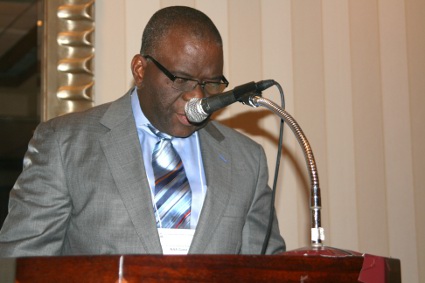
General
Andrew A. Azazi (rtd.)
Former Chief of Defense
Staff, Nigerian Army
Protocol
INTRODUCTORY REMARKS
The pattern of global
politics has radically altered, however in the Niger
Delta it seems that the
picture has remained the same. The villages and towns...are still
locked into a
cycle of extreme poverty, widespread unemployment, environmental
pollution and
social injustice.
The Next
Gulf
(Rowell, Marriott & Stockman)
In the Niger
Delta we need leaders who
have foresight, are committed and can give us good education, clean
water,
electricity, basic healthcare, infrastructure, justice and fairness.
While we
look up to those we have elected, we should accept that we are all
leaders in
our own right and could contribute to development if the new dawn we
are
seeking is not to elude us.
Isaac
Jasper Adaka Boro remains the most acknowledged iconic figure in the
entire
Niger Delta even though he lived for barely 30 years and had died since
1968.
He is remembered for meeting thoughts with action, selflessness through
seeking
the greater good for the Izon people and the ability to sensitize his
people to
fight a good cause. We must also acknowledge several others like Ernest
Ikoli,
Chief Dappa Biriye who demonstrated political astuteness in projecting
our
cause. King Jaja of Opobo and King Koko of Nembe had in the 1860s
suffered
severe humiliation in the handsof the British. The interpretation of
the man
Isaac Adaka Boro and his deeds seen as revolutionary extraordinaire has
engendered diverse actions through the years, including serving as a
rallying
point for self determination in the Niger
Delta. Others in the Niger
Delta like Ken Saro-Wiwa were inspired by the efforts of Boro who set
out to
improve the lot of his people. I must also recognise those who have
recently
worked in that light. Some others have denigrated his name by claiming
that
their actions are in consonance with the ideas propounded by Isaac
Boro. We
must however, recognize that time has changed the nature and means of
making
requests as of right and the necessity to learn from others (including
the
Izons in diasporas) how to achieve our set objectives in a manner that
would
endear us to other nationalities in the region and the international
community.
The
awareness engendered by heroes of the Niger
Delta has created
opportunities for indigenes to hold important portfolios in government
and the
necessity for oil multinationals to ensure best practices in their
operations
in the region. To buttress the point, Izon sons and daughters have
excelled in
different endeavours and have held or are holding key positions in the
Nigerian
government, from the position of President to the Petroleum, Foreign
and Niger
Delta ministries as well as headship of the Amnesty Programme. Some of
us have
excelled in the academia, in business and in their different chosen
fields.
There are also a good number of Izon people in diaspora having
knowledge of
better ways of doing things. What remains undone is to provide the
required
leadership that would ensure sustained development in the area through
optimal
utilization of the opportunities that now exist. There is also a
requirement to
build the psyche of the Izon people to see themselves as having equal
stakes in
the country and to stop feeling like the crumbs must be passed before
we can
eat. It is on these terms that I intend to consider the Isaac Boro
phenomenon
and current efforts in bringing development and sustainable peace to
the Niger
Delta. I will also take a cursory look at self determination efforts,
the post
amnesty situation, Izon unity, sustainable development and youth
empowerment.
HISTORY
OF NIGER
DELTA SELF DETERMINATION EFFORTS
Effort towards actualization of group
interest begins with
the determination of one’s own fate or cause of action
without compulsion. Self
determination is the concept of a group with a distinct culture having
the
right to choose their own political arrangements and political destiny,
right
to equality under the law and a right to nationality. Borrowing from
Wikipedia,
‘Self
determination is the free choice
of one’s own act without external compulsion, especially as
the freedom of
people of a given territory to determine their own political
status.’
History of Izon peoples’ quest self determination began with
agitation for
state creation. State creation became important to minorities in Nigeria
because it gave some identity and space in the polity.
With
the inauguration of the Rivers Division Peoples’ League and
the Rivers
State
Congress from 1944, the campaign graduated from self identity to a
separate Izon
State.
Izon leaders pressed on and formed the Rivers Chiefs and Peoples
Conference
(RCPC) on July 4,
1956
to strengthen their emancipation from the tyranny of their neighbour. In
1957 the colonial office invited RCPC to
present their case at the Constitutional Conference in London. The
Conference referred
the matter to the Willink’s Commission who also
rejected the demand for a separate Izon
State.
The Izon people
were not deterred by these setbacks; they formed the Niger
Delta Congress and eventually
formed alliances with the NCNC and other political parties but could
not make
any demonstrable impact because in all regional parliaments they were
outnumbered.
An
interesting aspect of self determination effort of the Izons is that
the quest
has always been to find political space within the Nigerian
State,
to have equal rights as other ethnic nationalities and not essentially
to
dismember the country. After the creation of Rivers State in 1967,
Adaka Boro
stated ‘...with
the creation of our
state (we) are now free to help not only our people, but also Nigeria
to peace,
unity, stability and progress’.
The desire has always been to bring
prosperity to the Izon nation, hence the agitation for resource
control’
believing that with adequate resources, development could be brought to
the
people within the territory. Experience has however, shown that there
is a
leadership challenge across the states in the Niger
Delta. From 1999 till date we
could make assessment for ourselves how our region has fared with the
leaders
we have had and resources available to us. As Nigeria
matures in democratic
governance, we must find the best methods to pursue our objectives
through
constitutionally acceptable means. Avoiding the Yugoslavia
scenario and embracing the UK
and Central
Asia models to self
determination
is therefore suggested.
ANALYZING
BORO AND THE MEANS
The
failure of politicians to make an in-road into the central government
in the First
Republic
came as a disappointment for the younger generation led by Adaka Boro.
He toyed
with socialism which taught him both its exciting and nuisance
elements. He
combed the West African Countries exploring collaborations with
President
Nkrumah, the Russians, Chinese and Cuban embassies for social
revolution in Nigeria.
At the time, his effort to seek external support failed. He had to take
his
destiny into his hands, sold his property and returned to Kaiama. With
150
Nigerian pounds he started recruitment at the Taylor Greek. After six
weeks
training his band of freedom fighters struck, believing that armed
revolution
would bring about the desired change. Addressing his men he stated
‘Today
is great day, not only in your lives, but also in the history of Niger
Delta. Perhaps, it would be the greatest day for a long time. Not
because we
are going to bring the heavens down, but because we are going to
demonstrate to
the world how we feel about oppression…fight for your
freedom’.
With
these words Boro, the General Officer Commanding the Niger
Delta Volunteer Service declared an independent Niger
Delta
Peoples
Republic.
Twelve days later, the revolution was foiled. The revolution however
succeeded
to the extent that it led to the creation of Rivers
State
with an Izon as the first Governor. Till date, I must say that this
young man
then, Lt
Alfred Papapriye
Diete-Spiff,
aged only 24 years made us very proud, because he built a solid
foundation
which sadly has not been followed through.
Historic
wrongs and official insensitivity to the rights of minority people of
the Niger
Delta threw up and sustained bloody agitations and insecurity in the
region.
According to Boro ‘there were no
adequate
educational opportunities,
no infrastructure, no empowerment, and no openings.
Economic
development of the area is the most
affecting aspect. The closest fishery industry was at Aba
at 80 miles
inland’.
Those
with military savvy will confirm that the decision to take on a state
with the
number of soldiers available to the NDVS was an impossible task..
However, some
lessons as I stated in my introductory remarks have been learnt from
the event.
The lesson which I find relevant for today’s event is the
need for visionary
leadership in the Niger
Delta and the requirement to seize fleeting opportunities to ensure
development
in the area. As was the case in the past, it is only the Izon people
that can
ensure that set objectives are achieved. Heaping the blame of our
situation on
others would in the near future be an argument for pity, which may not
find
support.
Moreover, it is no
longer
fashionable to wear the revolutionary toga, so we need to act
differently,
assisted by information and knowledge. Listening to the echoes of Adaka
Boro’s
speech, it is time to bring about development in the Niger
Delta and also empower the
youth, so that there can be hope in the land.
IMPACT
There
seem to have been a lull in agitations for prosperity in the Niger
Delta within the periods following
the Nigerian Civil War. This could be attributed to the expectation
that with
the creation of states, development could be brought close to the
people. After
several years and a number of governments, development still remains
elusive in
the Niger
Delta. Since governments remained unresponsive to the yearnings of the
people,
the oil multinationals became the surrogate Governments. Dialogue with
the
government or the multinationals have however not produced any
meaningful
outcome.
Just as
in the past, the youths thought the elders from the region had failed
to
guarantee their future. The failure of dialogue may have influenced the
decision to adopt a more confrontational approach. On 11
Dec 1990, Kaiama
Declaration by
the youth with a 10-Point Resolution called on IYC “to
coordinate the struggle of Ijaw people
for self determination and
justice”. The
significance of Kaiama was not lost on the youth and from
that point there has been a state of insecurity in the region as rival
gangs
clashed and even indigenes became victims of all kinds of atrocities.
All
activities in the region became incorrectly dubbed fight for self
determination
or for resource control. Ideological struggle became intertwined with
criminality and self seeking opportunities. It
is doubtful that
threatening fellow indigenes would qualify as
genuine quest for self determination. Neither can the distrust between
elders
and the youth, with the latter considering anyone going to discuss
matters
concerning development in the Niger Delta as seeking his own
settlement. This
situation has been taken advantage of and often deviously to undermine
the
support structures that we as a people could create for ourselves.
The
recent events in the Niger
Delta give the world the impression that the territory constitutes an
ungovernable space where the cost of doing business is high, mainly
because of
insecurity. The acts that led to insecurity in the region have not
benefitted
the region in anyway because the violence that brought the region to
global attention
was not properly managed. In fact, it is a departure from the
selflessness that
Adaka Boro represented through his struggle. Many observers doubt that
there
was any form of leadership in the entire Niger
Delta struggle from 1999.
In
that situation it
was impossible to discern a pattern or the next level to which the
region
aspired. What one observes is that no serious private investors have
staked
their resources in the region for over 20 years because of the risks
involved
in doing business in the area. Any process that would change this
perception
became a welcome development, provided it was done correctly and meant
to serve
the interest of the people. This was the spirit that informed the
suggestion to
utilize Demobilisation, Disarmament and Rehabilitation and
Reintegration
(DDR&R) to bring conflict in the region to a closure. This
process was
expected to be a deliberate, well coordinated effort that would take
care of
all interests and aimed at addressing the causes of the conflict.
AMNESTY
AND BEYOND
Alhaji
Umaru Musa Yar’Adua, then President, Commander in Chief of
the Armed Forces of
Nigeria, signed a proclamation in 2009, granting amnesty to the genuine
freedom-fighters of the Niger
Delta and asked for a change of strategy in our quest to liberate the
region.
Imperfect as this may seem, the response from arms-bearing individuals
in the Niger
Delta was encouraging. What the nation needed was to utilize the United
Nations
DDR&R standards to ensure that the gains made from the
declaration of amnesty
were sustained. There have been worries that individuals would play
politics
with the process and that the aspirations of the people may be
scuttled. We
must remind ourselves that a general amnesty without a corresponding
presence
of justice, equity and development of the Niger
Delta will be ineffectual, if
not counter-productive. Because the process is on-going it would be
incorrect
to pass a judgment as to its success. I believe that lending support to
the
programme would be in the best interest of the region. I therefore,
implore
anyone with expertise in the field to approach the coordinators of the
programme and make inputs, because at the end of the day we must
provide our
youth with requisite, and not just popular skills.
Our
expectations following the grant of amnesty and implementation of the
Federal
Government’s programme is to see a region that has its youths
constructively
engaged in more productive activities. To be gainfully employed, youths
need to
acquire new skills. I grew up knowing Izons to be a very industrious
group, but
the disturbing trend all over is that our youth have mostly resorted to
begging
and other rent seeking practices. There must be a culture of enjoying
the fruit
of your labour and the realization that hard work has its benefits.
This would
require a deliberate sensitization programme aimed at moral rectitude.
There is
also a need for vigilance because it is possible that some of the
criminality
in the Niger
Delta is perpetrated by non-indigenes. Elders should therefore, take
interest
in knowing what our youth are engaged in to be sure that they are not
being
misled into criminality. We cannot afford to lose the opportunity
presented by
having Izon children at the helm of affairs at this period in Nigeria’s
history.
States
and local government authorities across the region have a huge stake in
ensuring that the gains from this amnesty programme are not frittered
away by
sheer abdication of responsibility. I believe that at the appropriate
time
these organs of government need to claim ownership of the various
programmes
and sustain them in the interest of the region. There is a need to
encourage
those in authority at these levels of governance not to abandon
facilities/processes within the amnesty programme on the account that
it is a
Federal Government project as we have experienced in several other
instances.
Experience has shown that those in authority within the region are
often
isolated, not given the benefit of informal advice/exposure to methods
adopted
elsewhere to achieve sustainable outcomes and oftentimes are not
accountable to
the citizens. It is on this count that it is suggested that increased
interaction between Izon diaspora and those at home could produce
beneficial
outcomes for the region. If it is not happening, you must demand for it.
SUSTAINABLE
DEVELOPMENT
Travelling
through the states in the Niger
Delta reveals huge contradictions - the presence of luxury cars,
flamboyant
homes (which owner’s fortunes always seem to dwindle after a
few years) and a
large population of people living below the poverty line. Several years
after
the creation of States, it is a sad commentary on the ability of
citizens to
ensure sustainable development of the region. The infrastructure in the
entire
area without exception indicates that the welfare of people living
there is not
a priority now and in the future. In the past 12 years governance in
the region
has been in the hands of indigenes and so we cannot continue to blame
others
for the state of infrastructure. Even in areas where attempts have been
made,
they may not always meet the best standards. My assessment is that the
planning
processes have been faulty, being based on wrong assumptions and
satisfying
mainly political considerations. I wonder how we will fare if we have
to assess
the performance of all our Councillors, Local Government Chairmen,
Legislators
and Governors in the last one decade of democracy in Nigeria.
As an
optimist, I see hope. We need to learn how others not so far away from
the Niger
Delta have been able to rise above our standards. We can draw examples
from
what is currently happening in Lagos
and few closer home who are making effort. In these places, the new
infrastructure is impressive and meets international standards. The
visions
have been the handwork of individuals in position of leadership.
Clearly, what
has happened is that the states created enabling environments for
development
to thrive, utilizing the vehicle of business models that are available
on the
open market. Apart from that, indigenes are encouraged to participate
in
commercial activities that generate wealth. For this we need to wake up
our
entrepreneurial spirit and encourage each other to contribute to the
development of our area.
Apart
from infrastructure there are other areas of development for which
government
efforts need the support of the private sector. I should acknowledge
that some
States in the region have made appreciable effort towards providing
food and
shelter for its people in the near future. Unless there is a departure
from
what obtained in the past, these are also going to be ‘white
elephant’
projects.
YOUTH
EMPOWERMENT
The
greatest asset that we could have is possibly human capital development
and the
need for our youth to be prepared to take advantage of opportunities
available
to us to be able to compete favourably with all others in all spheres
of life.
Youth empowerment is a multi-facetted concept that cuts across social,
political, educational and technological spheres of life. In the Niger
Delta it
should go beyond negotiated relationship between government agencies
and the
‘restive youths’ born out of fear of destabilising
the exploitation of natural
resources, but the need to develop the creative potentials of the
youth. The
anomie in the area is as a result of disillusionment that pervades the
region.
The Izon youth remains
the hope
of the people in the Niger
Delta region. We therefore have a responsibility to ensure that they
view the
future as having possibilities. While counselling remains relevant, the
first
step is to provide them with functional education that would guarantee
their
ability to create jobs on graduation. In my opinion, education in all
forms is
key to empowering our youth. People are quick to point out that the
famous Bill
Gates did not complete university education, but we forget that he had
the
skills to excel in his field. Establishing skills acquisition centres
in
various communities is a commendable effort but the skills must be
relevant to
the industries that exist in the region. Since international
certification is a
requirement for engagement in some of the industries, effort could be
made to
accredit the centres that teach those skills.
Our
communities are degenerating because we seem not to have identified
that the
challenge we have is poverty, lack of ambition and lack of knowledge.
We have
different needs at community and individual levels and how we depart
from the
belief that oil is our God given right so, it is either oil or nothing
will
affect how we rise above the difficulties we have. The Niger
Delta environment is fertile
ground for entrepreneurship, but most of the local exploration,
logistics,
procurement, engineering companies are owned by people from outside our
environment. You can guess who they will employ. Meanwhile, I see most
of us
submitting CVs for nonexistent Government appointments.
Globalization
has provided the opportunity for individuals to network across national
boundaries. Our youths must be exposed to the use of the internet to
broaden
their knowledge base and to learn how youths in other climes face the
challenges of growing. States that are yet to establish internet
centres should
be encouraged to provide such in some of their schools. Individuals
could also
contribute in this regard by providing computers in their communities.
Actualising these ideas depend on the provision of constant electricity
in the
communities. It is a surprise that after several attempts at providing
electricity using gas turbines none of the states in the Niger
Delta can assure its people
that power can be guaranteed for 4 hours a day.
States
should be encouraged to embrace national empowerment schemes like the
poverty
eradication programme and the National Open Apprenticeship Scheme.
Beyond these
there should be a deliberate effort to ensure the following.
1.
Employment
counselling service.
2.
Skill
acquisition and entrepreneur development training.
3.
Provision
of
transient jobs.
4.
Access
to
micro credit schemes.
IZON
UNITY
The
spread of the Izon nation through 6 states in Nigeria
presents a special
challenge for its unity. Although culture and language remains a
unifying
factor, there is a need to nurture trust among our people. The
organizers of
this event deserve commendation for bringing together Izons in diaspora
and
others living at home. Beyond this, there should be concerted effort to
establish links with the people at home to pass progressive suggestions
as well
as showing interest in activities in our respective communities. There
needs to
be coordination among community leaders so that the entire Ijaw nation
speaks
in unison in matters of common interests.
When we
find ourselves outside our environment, and when things happen to
Izons, we
tend to band together. This could be very good and quite encouraging,
but I
don’t know if that is the only sort of unity we desire. I am
inclined to
contend that Izon unity could be an illusion if not broadly defined.
Could
unity be common Izon economic purpose, a desire to create institutions
that
would educate our youths to be self reliant people, a desire to choose
responsive leaders for ourselves? Of course we could easily talk of a
unique
Izon identity in our language, culture, art and institutions and
exploit them
in creative ways for modern living. Our riverine environment is a huge
blessing
so we could exploit it in architecture that is suitable; make available
potable
water using the rivers and unique means of transportation, all in
creating
Izonness. The reality however is that all around us we have very
diluted
societies and the Izons also do not exist as isolated entities in the
Nigerian
space. I like to think that progress and development should not be
hinged on
ethnicity, tribal unities and monolithic trend of thoughts.
The
networks we create in business and politics, the attractiveness of the
Izon
lifestyle will ensure that the non Izons are able to live gainful lives
in
Soku, Agbere, Arogbo, Peretorugbene and not just Port Harcourt, Yenagoa
and
Warri. Our self identity and the focus on improving our circumstances
could be the
basis for our unity. Our communities must matter to us. We must Let us
therefore encourage our diaspora establishments and institutions like
Ijaw
foundation, Izon historical society to create knowledge for progress.
CONCLUSION
As Nigeria
matures in democratic governance, we must find the best methods to
pursue our
objectives through constitutionally acceptable means. To realize
Boro’s dream,
Izons must be conscious of the need for visionary leadership in the Niger
Delta and the requirement to seize fleeting opportunities to ensure
development
in the area. The followership also has a role to play by constructively
engaging with those in positions of leadership. Izon diaspora should
encourage
those with relevant skills to spare no effort in ensuring that those at
home
learn about best practices in diverse fields of human endeavour.
However, we
must remind ourselves that our solutions may not always be the best, so
don’t
be disappointed or discouraged when they are not implemented.
Izons
are a hardworking people and we must be projected as such by disowning
criminality in the Niger
Delta. Our present predicament is caused by poverty, lack of knowledge,
inhibited ambition and the inability to focus on activities that could
generate
wealth for the region. We, therefore have an obligation to ensure that
the
youth rise above rent seeking by ensuring that they are given skills
that would
awaken their entrepreneurial spirit. Such awakening is likely to
engender
harmonious living between Izons and non-indigenes living in the Niger
Delta.
The
Izon identity remains unique, and we must strive to ensure that our
culture and
lifestyle is passed to generations yet unborn. I note with pleasure
that
gatherings like the Adaka Boro Day provides the opportunity to
enlighten and
remind ourselves of our situation and the need for self-assessment. We
simply
must raise our standards to fend for ourselves. While ensuring Izon
unity is a
necessity, I like to think that progress and development should not be
hinged
on ethnicity, tribal unities and monolithic trend of thoughts.
Today,
we find our son, Dr Goodluck Ebele Jonathan as President, Commander in
Chief of
the Armed Forces of Nigeria,
and rightly we expect prosperity and the opportunity for all us to
change our
lives. True, we have suffered long enough and that may not disappear
overnight.
I see a desire for many of us to be in key positions and indeed many
could
benefit, but let us also remember that while we think of the benefits
to the Niger
Delta, he is the President of the whole country. We need to be very
patient
with him, but most importantly, we need to work with him so that he
could
become the President that Nigeria
will remember for a long time. If he succeeds, the whole country will
be proud,
but the Izons will share more in the blame if he fails.
That
is our challenge.
Finally,
let me put on record my deep appreciation, the noble values which
motivated the
organisers of this event. I have my highest regards for you and please
be
assured of my support of your programmes now and in the future. You all
deserve
to be celebrated as true Izon citizens within the larger society of our
nation Nigeria.
I pray that God blesses us all as we strive to create for ourselves a
new dawn
in the Niger
Delta.
Photo
Gallery
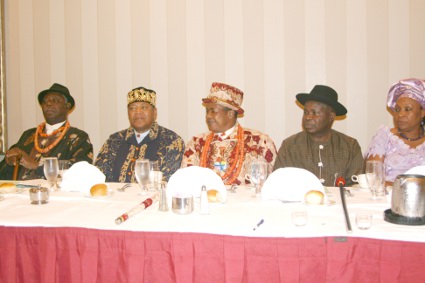
Cross
section of the High Table, listening to the keynote address. (L/R): HRM
King Alfred Diete-Spiff, HRM King Dandeson Jaja, HRM King Ayemi Botu,
Amb. and Mrs Felix Oboro
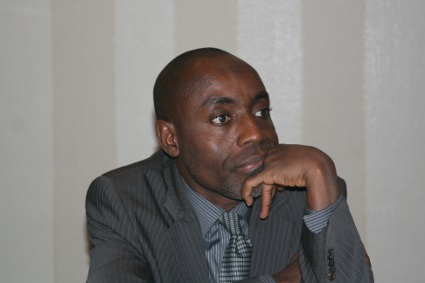
Hon.
Mr. Ibrahim
Auwalu, Consul-General of Nigeria - Listening to the Key Note address
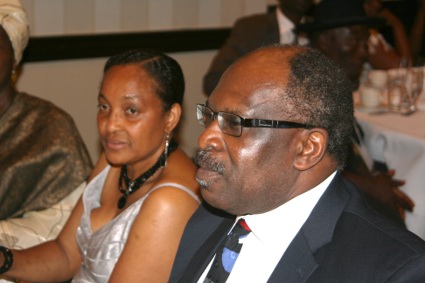
Cross
Section of attendees listening to the keynote address
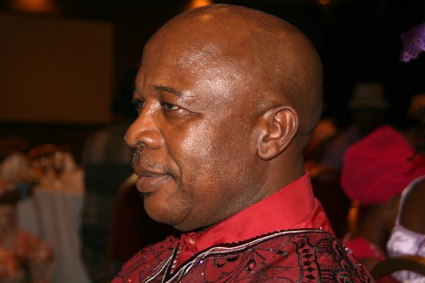
|

